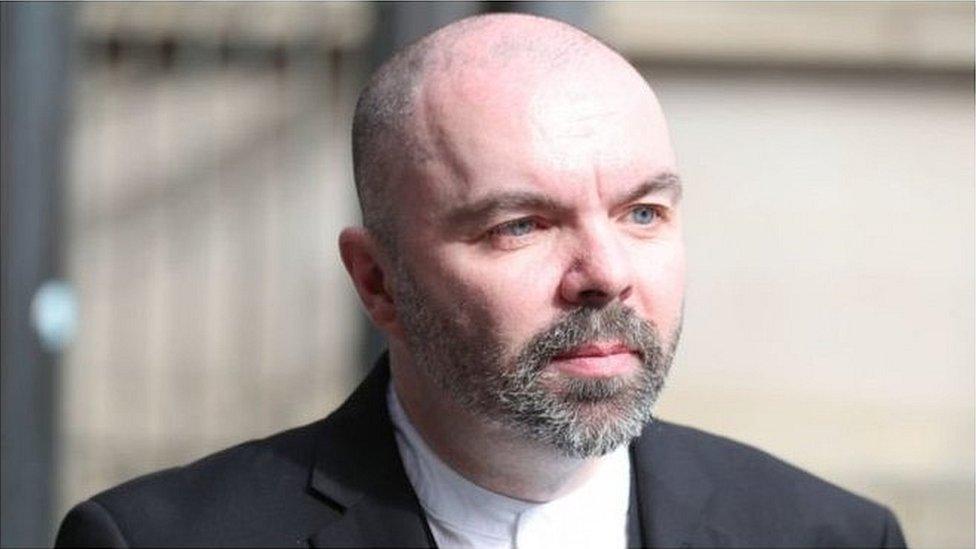Virtual court hears Kezia Dugdale defamation appeal
- Published

The case of independence blogger Stuart Campbell will be the first to be heard by a virtual court
Three Scottish judges have broken new ground by hearing a case in a "virtual court" held over video link.
The coronavirus lockdown has put much of Scotland's court system on hold, with jury trials suspended and many other hearings being pushed back.
However judges met via a video link to consider an appeal by pro-independence blogger Stuart Campbell in his legal dispute with former MSP Kezia Dugdale.
The courts service say virtual hearings could become a permanent fixture.
Scottish Courts and Tribunals Service Chief Executive Eric McQueen said judges, court staff and lawyers had worked together to create the virtual Inner House Appeal Court.
He said: "While this is an immediate response to coronavirus there is no doubt that the learning will inform our thinking to make virtual courts a permanent addition to our Scottish courts."
Mr McQueen said remote hearings could be used in civil courts throughout Scotland, beginning with the Court of Session, but also including the lower courts.
He said: "We are currently in discussion with sheriffs principal and the Law Society for Scotland on the scope of urgent and essential civil business in sheriff courts, to assess whether other business can be carried out remotely and what phased steps can be taken."
Kezia Dugdale's newspaper column was said by a sheriff to be "fair comment"
In the hearing, independence blogger Stuart Campbell is appealing against a sheriff's ruling in a defamation case he brought against the former Scottish Labour leader.
Mr Campbell, who blogs as "Wings Over Scotland", claimed he had been defamed by Ms Dugdale in a newspaper column in which she said he had sent "homophobic tweets".
At Edinburgh Sheriff Court Mr Campbell said this damaged his reputation and sought damages of 拢25,000.
In in April 2019, Sheriff Nigel Ross ruled Ms Dugdale was "incorrect" to imply that Mr Campbell was homophobic - but concluded that her comments were protected under the principles of fair comment.
Fact or opinion?
In the appeal hearing, Mr Campbell's advocate - Craig Sandison QC - argued that Ms Dugdale's claim was "an allegation of fact, not opinion or comment".
He said: "The statement complained of is not discernibly or clearly comment, in the eyes of the ordinary reader. If it does not meet those criteria of being capable as being seen as comment, then the defence of fair comment fails at the first hurdle."
Mr Sandison also said Ms Dugdale had been incorrect to talk about "homophobic tweets, plural", and that the former MSP did not have "any rational basis for the position that the tweet itself was homophobic".
Speaking for Ms Dugdale, QC Roddy Dunlop said her page in the Daily Record was very clearly a column, in which "one expects to read opinions, rather than breaking news".
He said that Mr Campbell "left himself open to commentary" that his tweet had been homophobic, and said the blogger himself "lives and dies" by freedom of expression in his posts online.
Lord Carloway, who heard the case alongside Lord Brodie and Lord Menzies, said a judgement would be issued at a later date.
The judge also praised the way the virtual meeting had been conducted, saying: "The technology worked well from the court's perspective and the hearing captured the ambience of a physical courtroom."
Many Scottish courtrooms are currently empty due to the coronavirus lockdown
The Scottish government is considering a range of possibilities for getting jury trials back up and running during the crisis.
Justice Secretary Humza Yousaf told MSPs on Tuesday that there could be "a potential backlog of 1,600 serious cases awaiting trial by August", with victims, witnesses and accused people facing delays.
He said talks had been held with the legal sector, human rights organisations and the courts service as well as opposition parties.
Ministers are examining possibilities including the use of smaller juries, increased social distancing measures within existing courtrooms, faster progression of trials post-lockdown and adjusting the sentencing powers of sheriff courts to let them handle more serious cases.
The government had earlier dropped proposals for serious cases to be heard without a jury after objections from the Faculty of Advocates and opposition parties.